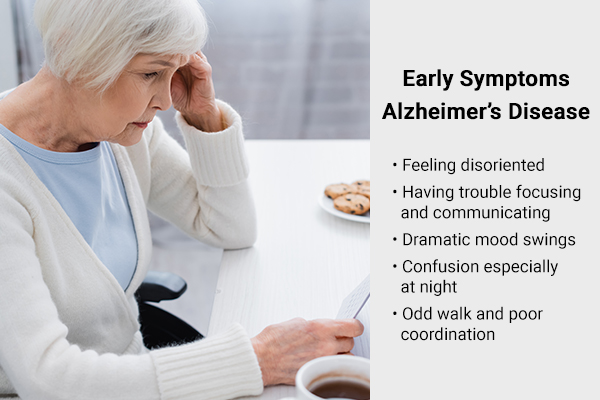In this article:
Alzheimer’s disease (AD), also called senile dementia, is a progressive degeneration of the brain. It destroys brain cells (neurons), resulting in loss of memory and finally leading to an inability to perform even the simplest of tasks.

There is no cure for the disease and treatment focuses on the management of symptoms. Family education is a must for the patient with Alzheimer’s disease. (1)
Scientists and doctors alike are not sure why some people get the disease but others don’t. What they do know is that two types of nerve cell damage lead to symptoms of Alzheimer’s disease: (2)
- Tangles in nerve cells called neurofibrillary tangles
- Protein deposits in the brain known as β-amyloid plaques (2)
Alzheimer’s disease is a progressive disorder and accounts for more than 50% of cases of dementia. (3)
How to Prevent or Delay Alzheimer’s Disease
Recent research indicates that the consumption of certain foods, supplementation, and the implementation of some lifestyle changes can help in preventing or delaying the development of Alzheimer’s disease. (4)
1. Diet and supplements
A vegetarian diet full of fruits, vegetables, nuts, legumes, and soy improves focus and cognition. (4)
2. Consume these herbs and spices
Many herbs have a preventive effect on Alzheimer’s disease. These include ashwagandha (Withania somnifera) (5) and brahmi (Bacopa monnieri). (6)
Turmeric, (7) cinnamon, (8) and other commonly used spices have also been shown to be beneficial in the prevention and treatment of Alzheimer’s disease by inhibiting amyloid protein aggregation.
3. Increase intake of omega-3 fatty acids
Regular consumption of foods high in omega-3 fatty acids, such as nuts (e.g., almonds) and salmon, inhibits amyloid protein aggregation and thereby delays or prevents Alzheimer’s disease in the early stages. (9)
4. Use coconut oil
Studies conducted on neurons have shown that coconut oil inhibits the effects of amyloid protein and therefore holds promise as a preventive agent for Alzheimer’s disease. (9)
5. Supplement with vitamins
Supplementation with vitamins including folic acid, vitamin B12, and vitamin D has been shown to have a neuroprotective effect against AD and increase cognitive function. (2)
6. Incorporate the following lifestyle changes
Lifestyle strategies that help in the prevention of delay of Alzheimer’s disease include physical activity, increasing socialization, calorie restriction, regular physical exercise, mental exercise for the brain, and avoidance of unhealthy habits. (2)(4)
- Increasing physical activity: Doing regular aerobic exercises or yoga for at least 30 minutes per day lowers the risk of Alzheimer’s disease. Breathing exercises such as brahmari improve the cognitive function of the brain. (10)(11)
- Increasing socialization: Socialization improves symptoms of Alzheimer’s disease. (12)
- Mental exercise: Exercising the brain creates new neuronal circuits, thereby improving cognition. (4) The activities that are recommended include reading the newspaper, solving crossword puzzles, learning a new language, and listening to music, (13) especially instrumental music.
- Quitting smoking and cutting down on alcohol. (14)
7. Management of preexisting conditions
If you have diabetes, make sure you keep to the diet and take your medicine. (2)
Early Symptoms of Alzheimer’s Disease

At first, people with Alzheimer’s disease have a hard time remembering recent events, but they may recall incidents from the past.
As the disease progresses, other symptoms occur. These include: (1)
- Feeling disoriented
- Having trouble focusing and communicating
- Dramatic mood swings
- Confusion, especially at night
- Odd walk and poor coordination
Initially, changes such as forgetfulness and subtle memory loss are usually ignored by the patient and family, and the patient shows no changes in social behavior or work. Patient’s history can reveal slow deterioration in personal hygiene, appearance, and concentration.
In the later stages of the disease, the patient shows undue and unrealistic suspicion of others, especially strangers, and crying or laughing without any reason.
Neurological signs include loss of smell and failure to describe various objects by just touching them without seeing. In the final stages of the disease, urinary or fecal incontinence is common. (15)
Treatment for Alzheimer’s Disease

Though there is no foolproof treatment for Alzheimer’s disease, early diagnosis can help in managing the disease and delaying its progress to a more serious stage. If you think you or a loved one has symptoms of Alzheimer’s disease, consult a doctor and get a diagnosis immediately.
Conventional treatment targets neurotransmitters or their receptors, (2) but it has many side effects and alternative options are better.
Diagnosing Alzheimer’s Disease
There’s no single test that can be used to diagnose Alzheimer’s disease, and it’s important to remember that memory problems do not necessarily mean you have Alzheimer’s disease.
A general physician will ask questions about any problems you’re experiencing and may do some tests to rule out other conditions. Based on the results, further testing will be organized such as brain scans.
Risk Factors for Alzheimer’s Disease
Alzheimer’s disease usually affects people over the age of 65 years. (1) About 1 in 8 people aged 65 years and above is afflicted. Women are more likely to have it than men.
A person can live with the disease for a few years to a few decades. Very often, people live with it for about 9 years. The biggest risk factors are being older or having someone in your family afflicted with Alzheimer’s disease.
There is also some evidence that people with hypertension and high levels of cholesterol have a greater chance of getting Alzheimer’s disease. (1) This theory is still being studied by researchers.
Head injury, (3) untreated depression, lifestyle factors, and conditions associated with cardiovascular disease also increase the risk of Alzheimer’s disease.
Additional Tips to Help the Patient
A few words for the family or caregivers of a patient with Alzheimer’s disease:
- It is easier said than done, but try to step into their shoes and try to look at the situation from their perspective. If they’ve reacted strongly after you’ve tried to bathe them or helped them use the toilet, it could be because they feel embarrassed or ashamed. Even though you know you’re only trying to help, dementia can mean the person you’re caring for no longer has the same level of reasoning or logic.
- Do not keep keys near them or near doors as they can take them as a sign to go away wandering from street to street.
- If they feel uncomfortable with strangers or new friends, do not force them to meet or interact with them. Instead, they will be happy to see an old photo album.
Most-Asked Questions About Alzheimer’s Disease
How does music help patients with dementia?
Music can refresh past memories and promote interconnection with others. Musical training delays cognitive decline and promotes brain function. (13)
What vitamins are beneficial for Alzheimer’s disease?
Vitamin B12 and folic acid. A deficiency of both vitamin B12 and folic acid is associated with dementia and Alzheimer’s disease. Taken together, these can improve symptoms of dementia.
What are the complications of Alzheimer’s disease?
Complications may include injury from the patient’s own violent behavior and pneumonia due to aspiration and also from malnutrition and dehydration.
Final Word
Doctors and researchers are not sure how to prevent Alzheimer’s disease. You can do several things to lower your risk of developing the disease.
Keeping yourself mentally and physically fit, adopting a healthy lifestyle, eating healthy food, and engaging in an active social life are all thought to help lower your risk of cognitive decline, including the development of Alzheimer’s disease.
- Was this article helpful?
- YES, THANKS!NOT REALLY


